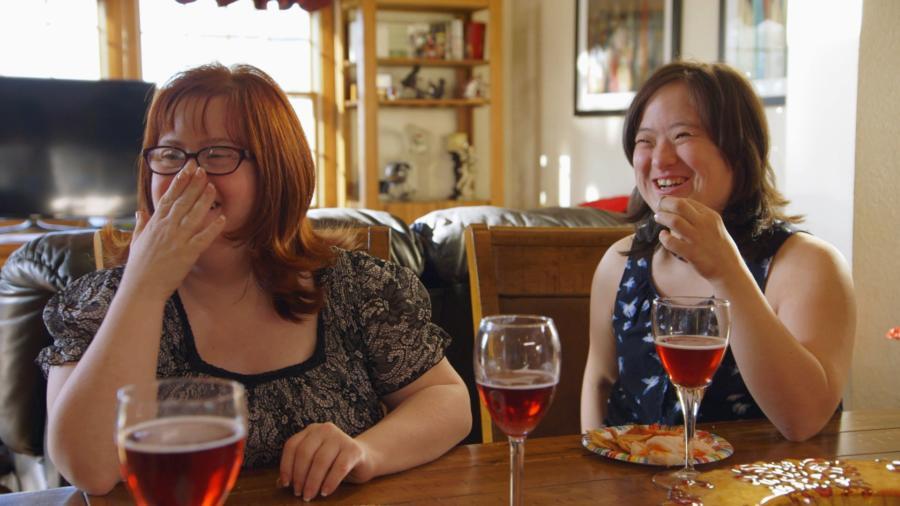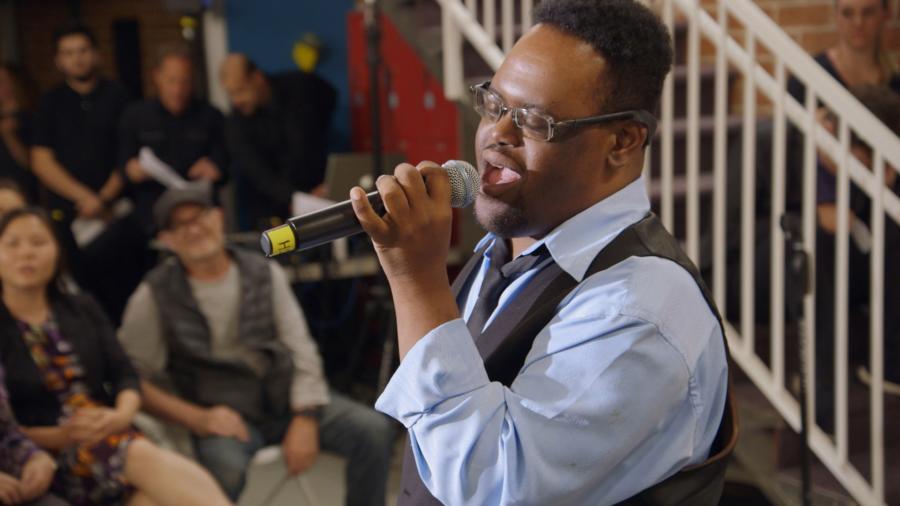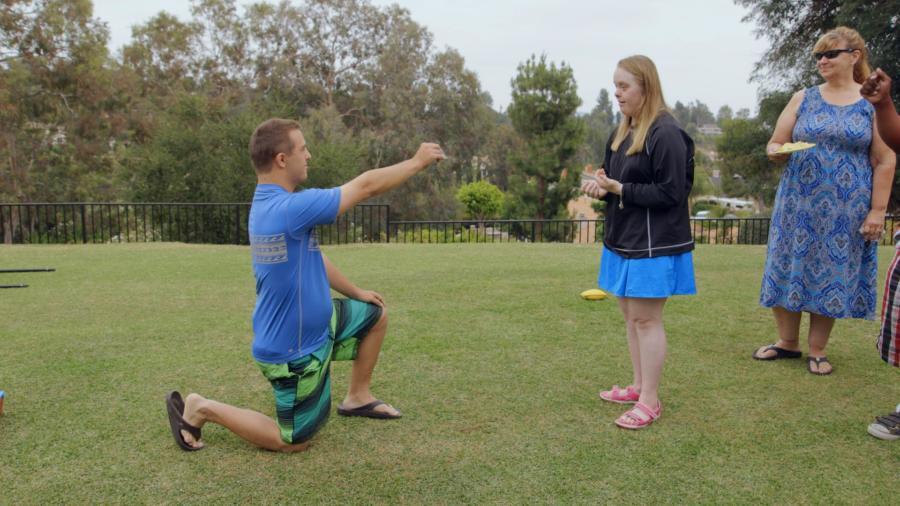Vulture's Senior Editor Kyle Buchanan and John Horn discuss some of the films that screened at TIFF and look at how the triad of fall film festivals (which includes Venice and Telluride) have already begun to shape the awards races; Reality TV veteran Jonathan Murray's latest show "Born This Way," follows a group of seven young adults with Down syndrome and their families.
With TIFF in the rearview, we take a look at the possible Oscar-race contenders
Vulture Senior Editor Kyle Buchanan is back from an epic week at the Toronto International Film Festival.
It's one of three fall festivals known to be launching platforms for the best films that will hit theaters — and streaming services — between now and the end of the year. And these festivals often host the premiere of the eventual Oscar best picture winner.
Buchanan joined The Frame's John Horn, who covered the Telluride Film Festival earlier in the year, to compare notes on how the fall film season is shaping up.
Conversation highlights:
Heading towards an awards season of woman-led stories:
Buchanan: That was the number one thing that I was struck by at these fall film festivals is what a surplus of female-fronted stories we got.
Horn: Those are words that we don't typically get to say!
Buchanan: No, and a lot of the time, there's a disconnect when it comes to Oscars season between the movies that are in contention for best picture and get nominated, and the movies that get a best actress nomination. A lot of the really worthy female-led stories crop up in best actress, but it's still the same macho bluster in best picture. I think that might be different this year.
Horn: I would put Jennifer Lawrence in "Mother!" on that list. I would also put Saoirse Ronan in "Ladybird," which is Greta Gerwig's vaguely, loosely autobigraphical story about a young woman in Sacramento who's a high school senior, who just knows there's something better for her just beyond her grasp.
Buchanan: There were a whole lot of woman-led that popped, especially at Toronto. There was "Molly's Game," Aaron Sorkin's movie about the poker maestro Molly Bloom, played by Jessica Chastain. "I, Tonya" is a biopic of disgraced figure skater Tonya Harding with Margot Robbie playing her. That was one of the most talked about movies in the festival - expect Margot to be hitting the campaign trail. But really expect Allison Janey, who was a force to be reckoned with as Tonya Harding's evil mother, to be perhaps the frontrunner as best supporting actress. I also really liked Emma Stone in "Battle of the Sexes" and Frances McDormand, who's incredible in "Three Billboards Outside Ebbing, Missouri." There is a lot to choose from.
This year's best picture winner has likely already premiered:
Buchanan: I think that films like "The Shape of Water" and films that came out earlier this year, like "Dunkirk," are probably the best situated. And yeah, some frontrunners like Gary Oldman in best actor are starting to form. But nothing overwhelming has happened yet, so I'm curious to see how it shakes out... I would say all but two of the eventual best picture [nominees] have screened at these film festivals. I think you'd have to go back quite a while to find a best picture winner that had not screened at this point.
And Gary Oldman is a surprisingly convincing Winston Churchill:
Buchanan: I think his performance is undeniable, and an incredible transformation. He's buried under prosthetics that I have to say look incredibly normal and lifelike. I didn't think who is this weird, garish balloon figure the whole time. I thought, that is Winston Churchill. And then had to periodically remind myself, it's also Gary Oldman! Who I never would have expected to be buried under all that makeup.
'Born This Way' is on a mission to demystify what it means to have a disability
From "The Real Housewives" to "The Bachelor," most so-called reality shows are technically more scripted and staged than they are portrayals of real life.
While there are exceptions, many top reality shows seem to revel in their participants’ failures or petty personal dramas. There is no such voyeuristic bias, however, behind the A&E reality series "Born This Way."
The show follows seven young adults who have Down Syndrome as they pursue their goals and dreams, and as their parents navigate parenthood and help their children live independently.
"Born This Way" was created by Jonathan Murray, who created the groundbreaking reality series "The Real World" on MTV. Since then he's had his hand in leading reality shows including "Project Runway" and "Keeping Up With the Kardashians."
The series picked up awards for Outstanding Casting for a Reality Program and Cinematography for a Reality Program at this year's Creative Arts Emmy Awards. It has been renewed for a fourth season.
When Murray stopped by The Frame, he talked about how he got "Born This Way" on the air and the challenges of producing a docu-series.

Below are excerpts from John Horn's interview with Johnathan Murray. To hear the full conversation, click on the player above.
INTERVIEW HIGHLIGHTS:
On getting the TV show "Born This Way" on the air:
This is probably the longest journey I've ever had in getting a show on the air. We initially did a pilot for A&E about a group of young people all with intellectual challenges -- not all Down Syndrome. And coming from The Real World, a show I created and still produce, I wanted to put them all in the same house together. We made the pilot, A&E didn't pick it up. I think in the end it felt contrived putting them in a house and I think we were missing an important story. And that is the story of young adults who have an intellectual challenge but in today's world they're being mainstream, they're being raised to become independent.
Four years later A&E calls me up and says, You know we've been looking at everything that we've been doing. Not much of it is working and we all started talking about that project that you had. What would you do with it today? So I had this wonderful opportunity to revisit it. I took a much more documentary approach and really zeroed in on this journey that these families are on. And these parents who have done such a good job of preparing their kids for independence. And now that they're young adults and wanting to take those steps to independence, they're having a hard time letting go. And that's a very relatable story.

On casting "Born this Way":
Casting is pretty much everything when you come to an unstructured show like "Born This Way," a docu-soap. There's no format. There's no game. The story's going to come from the cast. Interestingly enough, we focused on finding the young adults to center our show around. And we're very fortunate that in the Orange County, LA area, there's a very tight Down Syndrome community. And a lot of the young people attend the same arts organizations and they know each other. So already there were some of these families who knew each other. So we began to, through various non-profit organizations, and folks, we began to sort of find out who's out there. We started to bring them in for interviews. And usually one of their parents would come along for those interviews and we started to get to know the parents too. And it's really interesting because the most dynamic and interesting young adults who had Down Syndrome also had really interesting and dynamic parents. So I guess the apple didn't fall far from the tree. With a reality show, a lot of times during the casting process, that's actually part of the process of figuring out what the show is going to be. And I think in that process it really made us realize that this isn't just a story about these young adults. It's also a story about their families and about their siblings. And what these families have gone through and the journey they're on. Because these parents know they're not going to be around forever so they need to work with their young adults on a plan for independence so that they can go forward without them.
On the sense of mission that the parents and cast members feel in taking part in the show:
Yea I think there really is a sense of mission on the part of not only the parents but the cast members, that they do want to share their lives. And they all had stories of, you know, having their child and having someone's initial reaction to the fact that they had a child with Down Syndrome be sort of like, 'Oh, are you okay? Is this sad for you?' So there's a lot going on. They've suffered. The fact that some people have stared and not known how to react to their child. So it's a wonderful opportunity for them to share and I think one of the wonderful things that TV can do is it can demystify things. And I think that's one of the strengths of the show. So now maybe when you meet someone with Down Syndrome you're not as afraid to go up and say, Hey, how are you?

On the cast following their dreams:
Yeah, for us I think we are always cognizant, the fact that, like anybody else, our cast has hopes and dreams. How they work towards achieving those for each of them is unique. And so we're trying to chronicle that and we think that if we do it well we'll be able to create a show that anybody else out there can identify with. And quite honestly there have been times when I have -- and I know our crew has learned from our cast. I think they are much more direct often than we are. They don't play some of the games we play in communication. Particularly in the areas of dating, they're much more straightforward. So it's been sort of fun learning from them.
How the producers don't take advantage of the cast members:
It's something that we think about with all our shows. Starting at the very beginning of the process, we made sure that our families had some kind of representation when we were doing their contracts. Luckily there's an agent in town -- Gail Williamson -- who specializes in sort of diversity. And so seh sort of took on the process of negotiating the deal for our cast, for a lot of them. Because we wanted to make sure that we were not being exploitive. I talked to [activist] Anthony Shriver and he told me, You know, you've got to treat your cast, these young people with own syndrome, just like you would treat any other reality cast member. Don't focus so much on their differences. Don't whitewash this. You gotta give something that's honest. But at the same time... I do think when you've got cast members being so honest, as a producer you have to think about, Okay how much do I show of this? But I will tell you that's the case in any show that I do.

On the satisfaction Murrays get from working on "The Real World" versus "Born This Way":
I tell people season 3 of "The Real World," where we had Pedro Zamora on -- a young man who was HIV positive and really told his story -- for a lot of young people, he was the first person they met who was HIV positive. That was always my proudest moment in my career and now it's got a rivalry with "Born this Way." So yeah I mean I think all of us who work on the show -- and, believe me, we have people beating down our doors to work on this show -- they really want to do this show. It's a passion for all of us. And we're all sort of part of the show's mission. Because this isn't just entertainment. This show has a mission. It really is trying to open people's minds about disability and realizing we should be focused on the ability in the disability and we should maybe be making whatever accommodations we can to let people with disabilities be as full participants in the workplace and in the community.
To hear John Horn's full interview with Johnathan Murray, click on the player above. To get more content like this, subscribe to The Frame podcast on iTunes.





